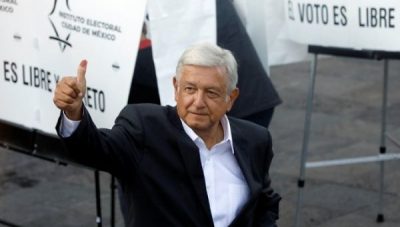Two Cheers for Mexico’s AMLO: A Great Victory for the Left

Note to readers: please click the share buttons above
On July 1, 2018, Andrés Manuel López Obrador, known by his initials as AMLO, was elected President of Mexico by a sweeping margin. He won 53% of the votes. His closest rivals were Ricardo Anaya (of PAN) with 22% and José Antonio Meade (of PRI) with 16 percent. In addition, his party alliance, MORENA, won a majority of the seats in the legislature.
His victory has been compared to that of Lula in Brazil and that of Jeremy Corbyn in Great Britain. But Lula did not come near having a majority of the votes, and his broad party alliance included reactionary groups. Corbyn is still struggling to maintain control of the British Labour Party and, even if he succeeds, faces a difficult election.
AMLO by contrast has probably the largest margin of victory ever of any contender in a multiparty relatively honest election. He will have no trouble remaining in power in the single six-year term permitted by the Mexican constitution.
So, why only two cheers? A look at Mexico’s history will clarify my reserve. The so-called Mexican Revolution of 1910 overthrew an oppressive and very undemocratic regime, which is why it is seen as the beginning of the modern state in Mexico. It did not, however, result in relative peace and stability. Quite the contrary! The two decades after that saw constant violent struggles between various armed militias, none of which were able to prevail.
However, following the assassination of a major candidate for the presidency, a de facto arrangement was able to bring about a certain degree of stability and greatly reduce the violence. The party that guaranteed this relative stability went through name changes and eventually became called the Partido Revolucionario Institucional, or PRI.
The system PRI evolved was based on Mexico’s constitutional requirement of an election every six years on July 1. The incumbent could have only one term. His successor was chosen by a behind-the-scenes negotiation among PRI leaders. The actual election was in effect a formality. With the exception of one politically radical period from 1936 to 1942, the PRI system of arranged elections resulted in governments with highly corrupt elites and ones that had little to offer to the bottom third to half the population.
The PRI system eventually reached a point of high popular discontent. It led to the emergence of a major challenger in the end of the twentieth century called the Partido Acción Nacional (PAN). PAN was built on a Catholic base that was reacting to Mexico’s and PRI’s strong anticlerical program.
PAN won the election in 2000, thereby ending PRI’s monopoly of office. In addition to PRI and PAN there emerged also a social-democratic party called the Partido de la Revolución Democrática (PRD). Mexico had now become a country of competitive elections. How much difference did this make? Not all that much.
AMLO ran as the PRD candidate in 2012 but was cheated out of his majority. He fought hard against the “false” winner, but with little support from the PRD. AMLO now built his struggle for power out of a rejection of all three major parties.
Why wasn’t he similarly cheated in 2018? The 2012-2018 PRI government used extreme violence against the opposition. They shot and killed student protestors. This led to widespread uprisings from underneath that made it impossible for PRI to cheat the results once again.
AMLO put forth a truly left program. He ran on a platform of significant increase in material distribution to the very large poor[I1] underclass. He called for the ending of the so-called pensiones[I2] by means of which enormous sums were paid to ex-presidents. AMLO was advocating instead pensiones for the poor. This is where his program was similar to that of Lula with his Bolsa familiar and his Hambre cero. The difference is that AMLO cannot be ousted from power, as was Lula.
AMLO calls his proposal nini (neither nor). For those that are neither students nor workers, who constitute a very large group of young people. He calls for payments to them to survive while they obtain the skills through government programs that will make them employable.
The Latin American left has hailed AMLO’s election, seeing in his victory a possibility of re-igniting the so-called pink tide in Latin America that had had many reverses in the last decade. The United States is clearly worried and unhappy. Trump is already trying to co-opt AMLO.
I too hail AMLO’s victory. But I worry about the fact that, unlike Lula, he has shown little taste for becoming a Latin American and not merely a Mexican leader. He is in a very strong position in Mexico for the moment, but not one impervious to counter-pressures. He cannot really do it alone. He needs the Latin American left just as they need him. We shall have to see how he navigates negotiations over NAFTA.
Finally, just like all popular leaders who have fought hard and successfully to come to power, I wonder how much he reflects on the limitations of being a charismatic figure. Too much self-assurance has been the downfall of many a leftist populist leader. Nor has AMLO indicated much tolerance in the past for those who question the prudence of some of what he does.
So, two cheers yes – loud ones, with hope for the best.

